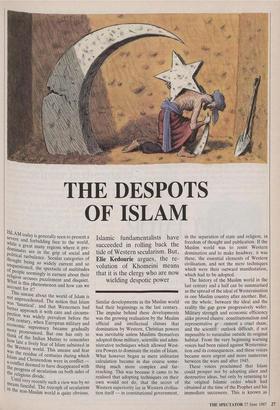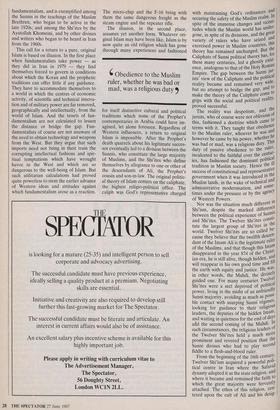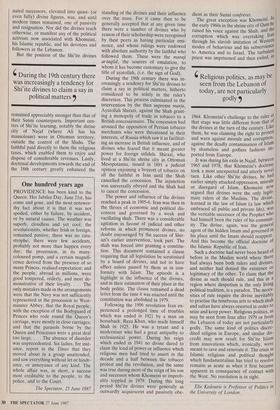THE DESPOTS OF ISLAM
wielding despotic power
ISLAM today is generally seen to present a severe and forbidding face to the world, while a great many regions where it pre- dominates are in the grip of social and Political turbulence. Secular categories of thought being so widely current and so unquestioned, the spectacle of multitudes of people seemingly in earnest about their religion arouses puzzlement and disquiet. What is this phenomenon and how can we
account for it?
This unease about the world of Islam is not unprecedented. The notion that Islam was 'fanatical', and that Westerners had better approach it with care and circums- pection was widely prevalent before the 19th century, when European military and economic supremacy became gradually More pronounced. But one has only to think of the Indian Mutiny to remember how late a lively fear of Islam subsisted in the Western world. This unease and fear was the residue of centuries during which Islam and Christendom were in conflict a conflict deemed to have disappeared with the progress of secularism on both sides of the religious divide.
Until very recently such a view was by no Means fanciful. The triumph of secularism in the non-Muslim world is quite obvious. Similar developments in the Muslim world had their beginnings in the last century. The impulse behind these developments was the growing realisation by the Muslim official and intellectual classes that domination by Western, Christian powers was inevitable unless Muslims themselves adopted those military, scientific and admi- nistrative techniques which allowed West- ern Powers to dominate the realm of Islam. What however began as mere utilitarian calculation became in due course some- thing much more complex and far- reaching. This was because it came to be realised that adopting techniques on their own would not do, that the secret of Western superiority lay in Western civilisa- tion itself — in constitutional government, in the separation of state and religion, in freedom of thought and publication. If the Muslim world was to resist Western domination and to make headway, it was these, the essential elements of Western civilisation, and not the mere techniques which were their outward manifestation, which had to be adopted.
The history of the Muslim world in the last century and a half can be summarised as the spread of the ideal of Westernisation in one Muslim country after another. But, on the whole, between the ideal and the reality the gap grew progressively wider. Military strength and economic efficiency alike proved elusive. constitutionalism and representative gr .rnment a cruel sham, and the scientifi': outlook difficult, if not impossible to naturalise outside its original habitat. From the very beginning warning voices had been raised against Westernisa- tion and its consequences. and these voices became more urgent and more numerous between the wars and after 1945.
These voices proclaimed that Islam could prosper not by adopting alien and destructive ideas, but only by returning to the original Islamic order which had obtained at the time of the Prophet and his immediate successors. This is known as fundamentalism, and is exemplified among the Sunnis in the teachings of the Muslim Brethren, who began to be active in the late 1920s; and among the Shi'ites by the Ayatollah Khomeini, and by other divines and writers who began to be heard in Iran from the 1960s.
This call for a return to a pure, original Islam is based on illusion. In the first place when fundamentalists take power — as they did in Iran in 1979 — they find themselves forced to govern in conditions about which the Koran and the prophetic traditions can offer little if any guidance. They have to accommodate themselves to a world in which the centres of economic activity, of scientific and technical innova- tion and of military power are far removed, geographically and intellectually, from the world of Islam. And the tenets of fun- damentalism are not calculated to lessen the distance or bridge the gap. Fun- damentalists of course are not unaware of the need to obtain technology and weapons from the West. But they argue that such imports need not bring in their train the corrupting intellectual fashions and spir- itual temptations which have wrought havoc in the West and which are so dangerous to the well-being of Islam. But such utilitarian calculations had proved quite powerless to stem the earlier advance of Western ideas and attitudes against which fundamentalism arose as a reaction. The micro-chip and the F-16 bring with them the same dangerous freight as the steam engine and the repeater rifle.
The illusion, in the second place, assumes yet another form. Whatever ori- ginal Islam may have been like, Islam is by now quite an old religion which has gone through many experiences and fashioned
4 Obedience to the Muslim ruler, whether he was bad or mad, was a religious duty
for itself distinctive cultural and political traditions which none of the Prophet's contemporaries in Arabia could have im- agined, let alone foreseen. Regardless of Western influences, a return to original Islam is impossible. After the Prophet's death quarrels about his legitimate succes- sor eventually led to a division between the Sunnis, who constitute the large majority of Muslims, and the Shi'ites who define themselves by allegiance to one or other of the descendants of Ali, the Prophet's cousin and son-in-law. The original politic- al theory of Islam centers on the caliphate, the highest religio-political office. The caliph was God's representative charged
with maintaining God's ordinances and securing the safety of the Muslim realm: In spite of the immense changes and vicissi- tudes which the Muslim world has under- gone, in spite of its divisions, and the great variety of rulers who have seized and exercised power in Muslim countries, this theory has remained unchanged. But the Caliphate of Sunni political theory has, for these many centuries, led a ghostly exist- ence, analogous to that of the Holy Rom. an Empire. The gap between the Sunni. jur- ists' view of the Caliphate and the political reality became and remained very wide" but no attempt to bridge the gap, and to make the theory of the Caliphate come to grips with the social and political reallrY, proved successful. The reality was despotism, and the
jurists, ,
urists, who of course were not oblivious c"- this, fashioned a doctrine which came to terms with it. They taught that obedience, to the Muslim ruler, whoever he was and however he came by his power, whether be was bad or mad, was a religious duty. Tills duty of passive obedience to the ruler, inculcated to the faithful over the centur- ies, has fashioned the dominant pnliticl„ tradition in Muslim society. Hence the Ill success of constitutional and representative government when it was introduced in the Muslim lands, in the wake of technical and administrative modernisation, and some- times under the pressure or by the agencY of Western Powers. Nor was the situation much different in Shi'ism, despite the marked difference between the political experience of Sunnis and Shi'ites. The Twelver Shi'ites consti- tute the largest group of Shi'ites in the world. Twelver Shi'ites are so called be- cause they believe that the twelfth descen- dant of the Imam All is the legitimate ruler of the Muslims, and that though this Imam disappeared in the year 874 of the Christ- ian era, he is still alive, though hidden, and will reappear in his own good time and fill the earth with equity and justice. He was' in other words, the Mandi, the divinely guided one. For many centuries Twelver Shi'ites were a sect deprived of political power, living in the midst of an unfriendly Sunni majority, avoiding as much as possi- ble contact with usurping Sunni regimes' looking for guidance to their religious leaders, the deputies of the hidden Imam, and waiting in quietness for the end of days acid the second coming of the Mandi. In such circumstances, the religious leaders of the Twelver Shi'ites held a much more prominent and revered position than the Sunni divines who had to play second fiddle to a flesh-and-blood ruler.
From the beginning of the 16th century' Twelver Shi'ism acquired a powerful poli- tical centre in Iran where the Safavid dynasty adopted it as the state religion, and where it became and remained the faith to which the great majority were fervently attached. The ethos of this religion, cen- tered upon the cult of Ali and his desig- nated successors, elevated into quasi- (or even fully) divine figures, was, and until modern times remained, one of passivity and resignation. Nor did the divines teach otherwise, or manifest any of the political activism now associated with Khomeini, his Islamic republic, and his devotees and followers in the Lebanon.
But the position of the Shi'ite divines
During the 19th century there was increasingly a tendency for Shi'ite divines to claim a say in political matters
remained appreciably stronger than that of their Sunni counterparts. Important cen- tres of Shi'ite learning, notably the shrine city of Najaf (where Ali has his mausoleum) were in Ottoman territory, outside the control of the Shahs. The faithful paid directly to them the religious taxes, which enabled them to enjoy and dispose of considerable revenues. Lastly, doctrinal developments towards the end of the 18th century greatly enhanced the standing of the divines and their influence over the mass. For it came then to be generally accepted that at any given time there were a number of divines who by reason of their scholarship were recognised by their peers as having particular emi- nence, and whose rulings were endowed with absolute authority by the faithful who followed them. These were the maraji at-taglid, the sources of emulation, to whom it has become customary to give the title of ayatollah, (i.e. the sign of God).
During the 19th century there was in- creasingly a tendency for Shi'ite divines to claim a say in political matters, hitherto considered to be solely in the ruler's discretion. This process culminated in the intervention by the then supreme marja, Ayatollah Shirazi, against the Shah grant- ing a monopoly of trade in tobacco to a British concessionaire. The concession had aroused the opposition of Persian tobacco merchants who were threatened in their interests, of Russia which saw it as facilitat- ing an increase in British influence, and of divines who feared that it meant greater power for foreign infidels. Shirazi, who lived at a Shi'ite shrine city in Ottoman Mesopotamia, issued in 1891 a judicial opinion enjoining a boycott of tobacco on all the faithful in Iran until the Shah cancelled the concession. The injunction was universally obeyed and the Shah had to cancel the concession.
The power and influence of the divines reached a peak in 1905-6. Iran was then in the throes of economic and political dis- content and governed by a weak and vacillating shah. There was a considerable agitation in favour of judicial and other reforms in which prominent divines, no doubt encouraged by the success of Shir- azi's earlier intervention, took part. The shah was forced into granting a constitu- tion. This document contained a clause requiring that all legislation be scrutinised by a board of divines, and not to have effect unless passed by them as in con- formity with Islam. The episode is a highlight in the influence of the divines, and in their estimation of their place in the body politic. The clause remained a dead letter from the time it was enacted until the constitution was abolished in 1979.
Following the 1906 revolution Iran ex- perienced a prolonged time of troubles which was ended in 1921 by a man on horseback, Reza Khan, who made himself Shah in 1925. He was a tyrant and a moderniser who had a great antipathy to ecclesiastical power. During his reign which ended in 1941 no divine dared to claim the kind of power or influence which religious men had tried to assert in the decade and a half between the tobacco protest and the revolution, and the same was true during most of the reign of his son and successor whom Khomeini so improb- ably toppled in 1979. During this long period Shi'ite divines were generally as outwardly acquiescent and passively obe- dient as their Sunni confreres. The great exception was Khomeini. In the early 1960s in the shrine city of Qum he raised his voice against the Shah, and the corruption which was overtaking frail through his slavish imitation of Western modes of behaviour and his subservience to America and to Israel. The turbulent priest was imprisoned and then exiled, in 4 Religious politics, as may be seen from the Lebanon of today, are not particularly godly woo 1964. Khomeini's challenge to the ruler at that stage was little different from that of the divines at the turn of the century. Like them, he was claiming the right to protest and warn against misrule and corruption, against the deadly contamination of Islam by shameless and godless fashions Im- ported from Europe. It was during his exile in Najaf, between 1965 and 1978, that Khomeini's doctrinetook a most unexpected and utterly novel turn, Like other Shi'ite divines, he had earlier simply attacked oppression, misrule or disregard of Islam. Khomeini now argued that divines were the only legiti- mate rulers of the Muslims. The divine, learned in the law of Islam (a law which embraced all public and private life), was the veritable successor of the Prophet who had himself been the ruler of his commun- ity. The divine, again, was the general agent of the hidden Imam and governed in his place until the Imam should reappear. And this become the official doctrine of the Islamic Republic of Iran. Such a doctrine had never been heard of before in the Muslim world where there had always been both rulers and divines, and neither had denied the existence or legitimacy of the other. To claim that the divine as such should rule, and this in a region where despotism is the only living political tradition, is a paradox. The neces- sities of rule require the divine inevitably to practise the tenebrous arts to which shah and sultan have always resorted in order to seize and keep power. Religious politics, as may be seen from Iran after 1979 or from the Lebanon of today are not particularly godly. The same kind of politics discre- dited religion in Europe, and similar dis- credit may now result for Shi'ite Islam from innovations which, ironically, were meant to save and renovate it. The crisis in Islamic religious and political thought which fundamentalism has tried to resolve remains as acute as when it first became apparent in consequence of contact with the West. No resolution is in sight.
Elie Kedourie is Professor of Politics in the University of London.











































































 Previous page
Previous page